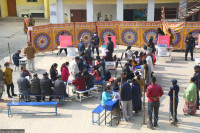National
Rifts in Congress, Maoists on reviewing ties after Koshi loss
Champa Karki of ruling coalition lost National Assembly vote on Thursday, sowing seed of mistrust in the alliance.
Anil Giri
The unexpected defeat of Champa Karki, the ruling coalition’s National Assembly candidate from Koshi Province, has created a ripple within the ruling alliance with the CPN (Maoist Centre) taking her defeat seriously.
The ruling alliance had fielded Karki of Maoist Centre and Krishna Prasad Sitaula of the Nepali Congress in Koshi Province. Karki was defeated by CPN-UML’s Rukmini Koirala with a few votes despite the ruling alliance having enough numbers to win. The Maoist Centre smells betrayal from Nepali Congress, raising voices in the party for a review of the alliance with the Congress, Maoist leaders said.
Two senior Maoist Centre leaders told the Post that a faction of the Congress was responsible for Karki’s defeat. They believe that the Congress faction rewarded the UML in return for the latter’s support in appointing Kedar Karki, a Congress leader, the chief minister of Koshi months ago.
After the back to back fall of governments led by UML’s Hikmat Karki and Udddav Thapa of the Congress, Kedar Karki of the Shekhar Koirala camp of the largest party was elected the chief minister in mid-October last year.
The UML’s support for the Karki-led government has given stability to the provincial government, which could otherwise have headed into midterm elections, which none of the big parties—the Congress, the UML or the Maoist Centre—wanted.
After Champa Karki’s defeat, on Friday, a meeting of Maoist Centre senior leaders also expressed reservations over repeated ‘breach of trust’ by Congress leaders.
In a surprise move, Kedar Karki had revolted in the Congress with the UML’s support and was elected the chief minister of Koshi Province. This had come as a shock to the top brass of the Congress and as well as the Maoist Centre.
“Even in the last local and general elections, our candidates did not get the required backing of the Nepali Congress,” a Maoist central committee member said. “Now we have seen the same kind of betrayal in the upper house elections, and the Congress helped defeat our candidate from Koshi Province.”
The Maoist provincial committee of Koshi also held a meeting on Friday and sent a report to the party headquarters. The report blames the “elements” that have always been critical of the Congress-Maoist Centre coalition for Champa Karki’s defeat. Based on the report, the Maoist Centre central leaders on Monday concluded that a review of allying with the Congress had become necessary.
There are also sceptics of such a review.
“Only if the relation between Prime Minister Pushpa Kamal and Nepali Congress President Sher Bahadur Deuba sours can there be such a review. I don’t expect the recent election results to have much impact on their pact,” said Ram Karki, secretary of the Maoist Centre.
But Maoist Centre Deputy General Secretary Barsha Man Pun asserts that the time had come to seriously review the party’s alliance with the Congress.
“The Nepali Congress has lost our trust,” Pun said while addressing a party’s event in Ropla on Saturday. “In every election, we have been supporting and casting votes for the Congress [candidates] but the Nepali Congress keeps on deceiving us.”
“The upper house election results from Koshi Province represents a new twist in national politics… What are the advantages and disadvantages of having an alliance with the Congress, we need to ponder.”
But the Congress is yet to institutionally review the National Assembly election results as many of its leaders are outside Kathmandu. But a party leader said some Congress voters were expected to cross the floor and defeat both Sitaula and Champa Karki.
“The main target was not Karki, but Sitaula. But this time Shekhar Koirala and other senior leaders sincerely supported Sitaula so he won, albeit with a thin margin,” the leader said.
“Nepali Congress has been tactful,” said Maoist Centre secretary Karki. “Since Deuba has been appeasing Prime Minister Dahal, there is no imminent threat to the ruling alliance. But on the other hand, another Congress faction is appeasing the UML and its chairman, KP Oli.”
Ahead of Kedar Karki’s nomination as chief minister of Koshi Province, Indra Bahadur Angbo of the Maoist Centre was all set to occupy the post. As no party has a majority in Koshi, it was vital for a chief minister candidate to somehow secure the UML’s backing in order to form a stable government. Karki, the incumbent Koshi chief minister, tactfully reached a ‘gentlemen’s agreement’ with the UML and clinched the post.
Angbo’s plans were crushed.
A group inside the Congress consisting of General Secretary Gagan Thapa and senior leader Shekhar Koirala isn’t happy with the alliance with the Maoist Centre. They have also been vocal about the failings of the Dahal government on service delivery and economy, among other areas.
Yet, the establishment Deuba camp seems to have no problem with PM Dahal and his government.
“The Nepali Congress often likes to point to factionalism and power struggles within it to cover up its mistakes. But this time, the intra-party struggle cannot be an excuse. Two years back too, Nepali Congress had betrayed the candidate of the Janata Samajbadi Party of the ruling alliance,” said Pun, who often speaks on the need for unity among Nepali communist forces, referring to the ruling alliance’s electoral defeat in Koshi.
Pun had also spoken out against Kedar Karki’s election as Koshi chief minister, arguing that it was in breach of the agreement between the top Congress and Maoist Centre leaders.
“The breach of trust in Koshi will be discussed in meetings of the ruling alliance,” said Pun, who is said to be a key adviser to Prime Minister Dahal. “Nepali Congress should review the impolitic and anarchical activities that are flourishing in that party.”
But Maoist Centre secretary Ram Karki is sceptical about reviewing ties with the Congress. “You also have to be clear about at what level such a review takes place. It can happen between four five leaders. Or if they want a more serious review, it can go up to the local level where there can be some protests. But I do not see much difference, nothing will happen.”
But the Congress is confident that the Maoist Centre cannot afford to sever ties with it. If not, Dahal may lose his prime minister’s post. “I do not think the current alliance is in imminent danger,” said Min Bishwakarma, head of the Congress publicity division. “Nepali Congress has faced similar challenges [of non-cooperation] in other provinces.”
“If the Maoists raise this issue prominently, we will say sorry. But we can then raise questions about similar breach of trust and lack of transfer of Maoist Centre votes to the Congress in other provinces. Others have deceived us too. How come the UML’s vote increased and why the ruling party could not get the vote it was supposed to get ?”
While the UML candidate pulled off a surprising victory in Koshi Province against Maoist’s Karki, the party also secured more votes than the total vote weightage of its elected representatives in various other provinces as well.
According to Bishwakarma, the Congress party would review the National Assembly election result in Koshi where the UML candidate got more vote weightage than what was initially expected while the ruling alliance candidate did not get the votes as per the number of their elected representatives.
Provincial Assembly members; mayors and deputy mayors; and chairs and vice-chairs of local units of the seven provinces voted to elect the upper house members.




 27.48°C Kathmandu
27.48°C Kathmandu














